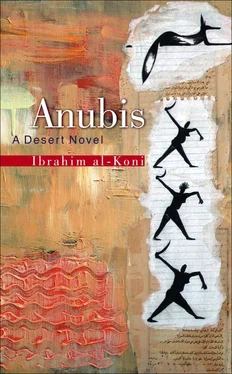WE MET AT THE CURVE of the ravine as she headed toward the pasture with her flocks. When she caught sight of my bloodstained shirt, she gasped in alarm but did not release her index finger, which she sucked to mask her alarm. She was hard to understand while she chewed on her finger. “What’s this? Did you slaughter a kid or a billygoat?”
“Yes, indeed; I’ve slaughtered a billygoat. Yesterday I slaughtered a black goat.”
She stared at me skeptically before continuing: “Was it a sacrifice?”
“Yes, indeed, a sacrifice.”
I gazed at her black eyes, which were as deep as the gazelle’s, before adding, “I slaughtered the goat as a sacrifice for my mother’s spirit.”
Her eyes gleamed with the sparkle we see only in gazelles’ eyes. This sparkle is not to be understood, investigated, or resisted. I turned my face away and allowed my gaze to soar across the open lands in search of some inspiration to help me express my secret, “Didn’t you say he slaughtered her on the tomb the way you’d slaughter a ewe?”
She stopped chewing on her finger. The color of kohl spread through her eyes, and blackness dominated them so entirely that they became even deeper, more beautiful, and more enigmatic. I got the shakes and felt feverish again.
I saw him fall to his haunches, balancing himself on the tips of his fingers opposite me, bleeding, bleeding, bleeding. Not a single moan of suffering or groan of pain escaped him when the knife settled in his throat. In fact, he stayed erect so long I was convinced he was a demonic child of the jinn. He fell in my lap, however, just when I had decided to flee. He fell into my lap like a pile of chaff or feathers. He fell into my lap as if wishing to seek refuge with me. He fell into my lap, because the slain person must seek refuge with his killer. He fell into my lap because it is decreed that slain men take refuge with their slayers.
I gazed into her eyes. I gazed until I disappeared into their depths. I pulled the knife from my sleeve and flourished it in the air as if combating an invisible enemy. In a stranger’s voice I croaked, “I stabbed him like this. I stabbed him in the throat. Like this! And this! Ha, ha, ha ….”
I swallowed my laughter and exhaled. I blew out all my breath until I began to suffocate for lack of air. I was drenched with sweat, and my eyes found nothing to focus on until they settled on the knife fouled by the victim’s blood. At that moment I heard her voice and was astonished. I was astonished, because I had forgotten her. I had thought myself alone in the wilderness and so had forgotten her. She took me by the hand and sat me down beside her on a hill overlooking the ravine. She said quite distinctly: “You don’t know what you’ve done.”
Then she paraphrased her words in the same authoritative tone, “Oh, if you only knew what you’ve done!”
I interrupted her, with even more authority, “I did what I had to do! I never regret an act I’ve committed.”
She bit her finger and rocked as if ready to emit a wail of mourning, “But it’s an act that makes repentance for any other deed you commit superfluous.”
I did not understand her and kept silent. We were both silent for a time. I tried to catch my breath, but she showed me no mercy. “You’ve killed your father! You’ve killed your dad!”
I thought she was affecting the language that elders use when they speak equivocally. I thought she was reciting a story of past generations, one that would end with a moral, aphorism, or a saying with a hidden reference, but she turned toward me and stated with a clarity that banished all doubt, “Don’t you realize that you’ve killed your father, wretch?”
Dumbfounded, I protested, “I don’t know what you mean.”
“The priest was your father.”
I laughed. I laughed even though I was short of breath. I said with great certainty, “If the priest was my father, then I would never have lost my father.”
“You don’t understand.”
“Didn’t you tell me once that my father came to my house the day I set off to search for him in the desert’s labyrinth?”
“I did not lie.”
“You also said he followed me, to bring me back.”
“I did not lie.”
“But he brought back my mother, not me.”
“If he had not taken your mother, he would never have brought you back. If he had not taken your mother, you would not find yourself striding through the desert on two feet.”
“But how can I have searched for my father throughout the world when he was within arm’s reach?”
“All the things we search for in faraway places are actually within arm’s reach.”
Again she had begun to speak in riddles. Once more this young vixen, who had told me she had learned to speak by learning to listen, had begun to speak in the language of the priestess, with all the certainty of the priestess.
I did not listen, however, for I could not wait to ask, “But by what right did the priest become my father?”
“Priests were created to be fathers. Those men we call our fathers actually aren’t.”
“Then who are the priests? Who are the fathers?”
“The fathers are shadowy figures. The priests are real.”
“If you want me to understand the truth about the priests, then don’t speak to me in the language of the priests.”
“Fathers are always a lie.”
“You’re lying.”
“But the priest is the master of prophecy. We are the children of prophecy. All the children of the tribe are children of prophecy. All the children of the desert are children of prophecy.”
“I’d have to be a priest to understand your riddles about prophecy.”
“That’s why we’ve inherited from the ancients a saying— endorsed by our lost law — that recognizes the mother as the sole parent. We offspring are as lost as the lost law, because we are kin to prophecy on our father’s side and to the desert on our mother’s.”
“I heard my mother say something like that.”
“That’s why, according to the law, you’re not merely a patricide but a deicide.”
“Lie!”
“He who kills prophecy kills the lord.”
“Lie!”
“And that’s not all.”
Through this medium’s eyes I detected a new danger. In the eyes of this she-jinni I beheld a new prophecy. I was shaking and feverish. I was disoriented, but even so I heard correctly what she said next, “You must understand that you killed not only your own father but mine as well.”
“What are you saying?”
She cast her glance far away. She raised her index finger toward the empty space as though pointing out an unknown talisman. Then she bombarded my ears with this painful prophecy, “I’m your sister!”
Although I did not believe this, I did not enquire any further, because my chest felt weighed down. I do not know how much time I spent on that hillock. I also do not know whether it was evening or daytime, sunset, or dawn. I reflected on my reality as a creature that has been abandoned, that is lost, and that will never discover his fatherland or his father. I discovered in my reality every desert son’s true nature, since he must acknowledge his misery at having lost all trace of his paternal lineage. He is destined to fall under customary law, which traces kinship maternally. He has to content himself with his lot, which is identical to that of Anubi.
I decided to flee at once from the tribe, from the desert, and even from myself. Perhaps I could free myself from my destiny. I roamed through the wasteland; I might experience a rebirth in the settlements of the land known as Targa.
I did not feel any bitterness over losing my sense of time nor did I regret losing the savor of days; I remember that I stretched out one day in a solitary place enveloped in darkness and slept as I had never slept before, unaware of the advent of evening or of the morn of the following day.
Читать дальше












